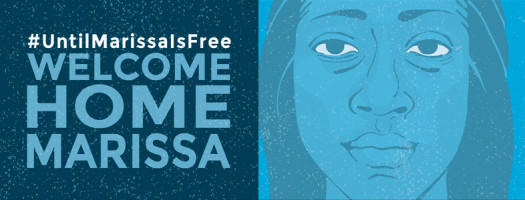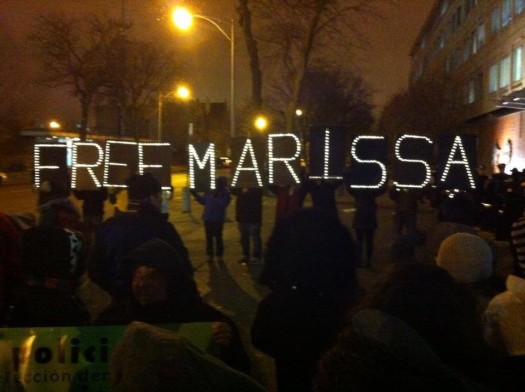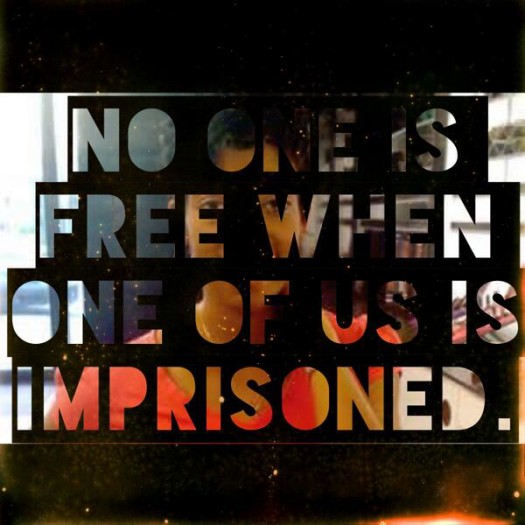Marissa Alexander Did Not Die…
Marissa Alexander didn’t die.
In spite of her husband threatening to kill her & the state of Florida relentlessly pursuing social death, Marissa walked out of a Duval County jail yesterday. Alive.
She had a hearing and thankfully the judge accepted the terms of her plea deal with the state of Florida which means that she gets to go home to spend the next two years electronically shackled under house arrest. And this is supposed to be “justice” for her. We are expected to be relieved and in many ways we are. The state is so diabolically effective at criminalizing and killing our friends that the bar has been lowered regarding what counts as victory.
Marissa spent 3 years in jail and has also served a year already under house arrest. All told, she will have spent over 6 years under some form of incarceration and state supervision for firing a warning shot to defend against her abusive husband. No one was hurt by the shot and yet Marissa has lost years of her life.
I became aware of Marissa and her plight in 2011. In 2012, after Trayvon Martin was killed & her name became more well-known, I paid closer attention to her legal tribulations. I wrote my first post referencing her conviction in May 2012. It was an essay focusing on how women of color have historically been denied access to self-defense when faced with violence. I specifically related Marissa’s story to that of Inez Garcia. For the most part though, I didn’t get actively involved in Marissa’s defense. I was busy with many other projects and I saw that she had support from the Free Marissa NOW National Mobilization Campaign.
In early 2013, I saw a photograph of some white comrades holding a banner in support of Marissa at a Chicago rally and it pushed me over the edge. I was relieved that people in my city were lifting up her name and I was embarrassed that white people were the ones publicly showing her solidarity. How could a city like Chicago, home to thousands of Black people, not have a local defense committee to support her? The question kept gnawing at me. I was still swamped with other work and felt that I wouldn’t have the capacity to take on building yet another organization.
In the summer of 2013, I finally decided that I would organize a teach-in on Marissa’s case. I’d host it on her birthday in September in response to a national call to action by FMN. I reasoned that if participants were exposed to the injustice of the case and provided with an opportunity to organize on her behalf that they would. It’s exactly what happened. The twist was that, while I initially warned that I would only be able to serve as a sporadic adviser to the local defense committee, I ended up getting drawn into a co-organizer role fairly early. Working with my fellow Chicago Alliance to Free Marissa Alexander (CAFMA) organizers has been one of the best prisoner defense committee and organizing experiences that I’ve had.
I’ve written briefly about the importance of a defense committee for prisoners:
“Marissa Alexander is a person. She is also fighting a case and that case illuminates a greater cause. But she is a human being. This is something that can be overlooked. It’s easy to do for a number of reasons. Most defendants are advised by their attorneys to keep quiet while facing charges. This creates a vacuum. If the defendant is lucky, others step in to speak for them and to act as their surrogate filling in the gaps in their story. This is the position in which Marissa finds herself.
And so it falls to others to find ways to keep her name and her story in the public’s mind. It falls to others to devise creative ways of engaging new supporters. It falls to others to convince people that they should care about the defendant and that they should offer material support for a prisoner.
One of the important lessons that I’ve learned in my years of prisoner defense committee work is how isolating and lonely the criminal legal process is. This is particularly true for detainees who find themselves jailed while awaiting trial or a plea deal. It is difficult to make peace with the loss of your freedom when you haven’t been convicted. Letters and other communications are lifelines for those who find themselves in such a predicament. The knowledge that people on the outside care about you, haven’t forgotten about you, and support you is encouraging. Often it makes the difference between giving up and staying hopeful. That line is an excruciatingly thin one.”
I’ve been all in with Marissa and her case since late summer 2013. Ten days prior to her expected release, CAFMA spearheaded a 10 day fundraising campaign to insure that she would not be burdened with paying for her own incarceration (through electronic monitoring). We estimated that it would cost $11,000 for two years of house arrest and thanks to generous supporters that goal was met in the first three days of the campaign. So yesterday, Marissa walked out of jail with at least one less financial worry. She is also no longer facing a mandatory minimum sentence of 20 years (for her initial conviction) or potentially 60 years (had she been convicted in a retrial). I suppose that I should take some solace in this. Unfortunately, I feel a conflicting set of emotions. On the one hand, I feel a seething, low grade rage and one the other, I am filled with gratitude and love.
I am angry that Marissa, a victim of domestic violence, has had to spend even one day in jail for defending herself. I am angry that Marissa, a mother of three, has spent years away from her children. I am angry at a spiteful and vindictive prosecutor who abused her discretion and pursued Marissa like Ahab. I am angry that Marissa is still shackled to the state for two more years and that she is expected to pay for her continued confinement. I am angry that while we successfully raised money for Marissa’s legal defense too many people (including black people) stayed quiet on the sideline. I am angry because of the Marissas of the past, the current Marissas and the future ones. I am angry because violence against women continues unabated. I am angry because too many black women’s lives DO NOT in fact matter. I am angry.
Alongside my justified anger, however, lies profound love and gratitude. I am grateful that Marissa wasn’t broken by her experience of injustice. I am grateful that she has a family and particularly a mother who has stood steadfastly by her side throughout this ordeal. I am grateful to Aleta, Sumayya, Helen and to my friend Alisa for taking the initiative to launch the Free Marissa Now mobilization campaign in 2012. The countless hours, days, weeks, months, and years that you labored are valued. I saw you. Thank you. I am grateful to my comrades and friends of the Chicago Alliance to Free Marissa Alexander (CAFMA), particularly Tasasha, Maya, Holly, Ash, Monica, Sean, Jessica, Sarah, Rachel, Jennifer, Olivia, Suey, Gail, Chez and most especially Ayanna. Your creativity, passion, and persistence are unmatched.
There are many more people in Chicago & across the country who contributed their talents, art, money and time to supporting Marissa and I am grateful to and for them all. Thank you Mychal, Vikki, Molly, Esther, William, Micah, Caitlin, Malcolm, Steve, Bianca, Kiese, DJ, Trudy, Christina, Lindsay, Brandon, Jamal, Nikki, Jasiri, Beth, Lauren, Emily, Jenn, Billy, Lewis, Noah, Allison, Vivi, Sage, Brandi, Kelly, Sam, Scheherazade, Mary, Lex, Zachary, Rachel, Shaun, Claudia, Dave, Andy, and many, many more. Some of the people who helped like Lauren suffered the negative consequences of state surveillance as a result; reminding us that doing this work takes a toll and is always risky. I am grateful to the ones who took the risk. I am grateful for our resistance and our endurance. I am grateful for the witness. I am grateful for our stubborn insistence to love each other even when the world is unloving toward us. I am grateful for beauty in the bricks.
Marissa is out of jail but she is still not free. I hope that supporters will continue to care about what happens from here on out. For my part, I am going to take a break from prisoner defense work. I am certain that it won’t be a long one. There are too many people locked up and too much injustice. But it’s important in this work to preserve one’s mind, body and spirit. It’s important to prevent burn out. So I’ll step away for a little while sure to be drawn back again by another travesty of injustice. I will keep an eye out for Marissa and I’ll be ready to support her in what comes next.
We welcome our sister home understanding that she’s still not free. Cognizant also that none of us is free while others are caged.
But Marissa did not die. For this, on this day, we rejoice. In the words of the great writer-poet Lucille Clifton: come celebrate/with me that everyday/something has tried to kill me/and has failed.
Marissa will need money as she gets on her feet. If you have a few dollars, please contribute to her restoration here.




By Gail Smith, January 28, 2015 @ 5:49 pm
FWFI, CLAIM is working with a small coalition to create a mechanism for women convicted of acts taken in self-defense or affected by their history of being abused to request re-sentencing. It is small. We will get major push-back. It is badly needed, considering the women who are held in Logan and Decatur.
By Gail Smith, January 28, 2015 @ 5:50 pm
Can’t edit my initial typo above — For What It’s Worth.